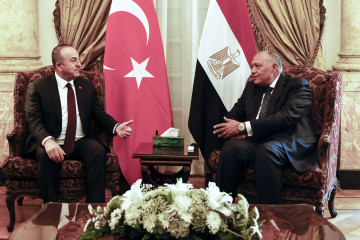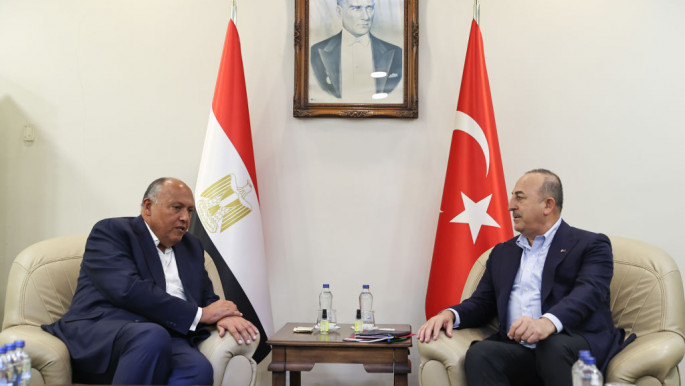

On 18 March, Turkish Foreign Minister Mevlut Cavusoglu visited Cairo for the first time since President Abdel Fattah el-Sisi seized power in the July 2013 coup.
After meeting with his Egyptian counterpart, Sameh Shoukry, Cavusoglu vowed to upgrade Turkey’s diplomatic relations with Egypt to ambassador level “as soon as possible.”
Shoukry’s response was more measured, as he said that ambassadors would be restored at the appropriate time “depending on the positive results it brings”.
Despite this contradiction, a decade-long deep freeze in Egypt-Turkey relations came to an official end. This breakthrough was the culmination of a dialogue process that began in earnest in May 2021.
"Notwithstanding areas of progress, a genuine normalisation between Turkey and Egypt could prove challenging, as rivalries persist in Libya, Syria, the Eastern Mediterranean, and Africa"
The first stage of Turkey-Egypt dialogue focused on regional issues, such as Syria, Iraq, and the Eastern Mediterranean.
After these discussions, Egypt implored Turkey to refrain from interfering in its internal affairs and supporting extremism.
Turkey’s refusal to label the Muslim Brotherhood as a terrorist organisation initially stalled the normalisation but Ankara restarted the process by proposing a Turkey-Egypt parliamentary friendship group.
Sisi’s handshake with Turkish President Recep Tayyip Erdogan at the November 2022 FIFA World Cup in Doha caused representatives from both countries to discuss increased investments, which presaged Cavusoglu’s trip.
The easing of tensions between Turkey and Egypt has strengthened bilateral economic ties. In 2022, trade between the two countries increased by 14%, Turkish investment in Egypt soared by 30.3%, and Egypt’s exports to Turkey rose by 32.3%.
The arrival of a Turkish business delegation in Cairo on 16 February resulted in $500 million in new investment pledges in Egypt, which increased total investment to $2 billion.
Sisi also approved of Turkey’s crackdowns on exiled Muslim Brotherhood members, which includes restrictions on television stations operated by Egyptian dissidents.
Notwithstanding these areas of progress, a genuine normalisation between Turkey and Egypt could prove challenging, as rivalries persist in Libya, Syria, the Eastern Mediterranean and Africa.
|
|
Egypt and Turkey's contrasting positions on Libya and Syria
Although Egypt supported Libya National Army (LNA) chieftain Khalifa Haftar and Turkey backed the Government of National Accord (GNA) during the LNA’s 2019-20 offensive on Tripoli, Turkey contends that its frictions with Egypt over Libya are in the past.
During his meeting with Shoukry, Cavusoglu asserted that Turkey’s military presence in Libya “is not against Egypt’s interests” and claimed that both countries agree to consult closely on Libya.
Cavusoglu’s assessment of the level of Egypt-Turkey coordination in Libya might be overly optimistic. Despite Cavusoglu’s reassurances, Egypt is steadfastly opposed to Turkey’s military presence in western Libya.
During an October 2022 Al-Arabiya interview, Shoukry claimed that Turkey’s intransigent retention of forces in Libya derailed normalisation talks with Egypt. Turkey’s retention of al-Watiya airbase is a point of contention for Egypt, as it fears that it might be followed by the development of a naval base on Libya’s coast.
Egypt’s construction of the 3 July naval base in Gargoub underscores its desire to contain Turkish influence on Libya’s coast.
Turkey’s January 2022 outreach to Tobruk-based House of Representatives Speaker Aguila Saleh, a key Egyptian ally in eastern Libya, coincided with Egypt’s intensified economic outreaches to Tripoli.
This underscores the willingness of both regional powers to infringe on their traditional zones of influence and could trigger a major collision over Libya’s elections.
"As Assad opposes dialogue with Erdogan until Turkey ends its 'occupation' of northern Syria, Cairo and Ankara will likely remain at odds on this issue going forward"
Egypt’s obstructionism of a common statement in late 2022 on Libya underscored its fear that free elections will weaken eastern Libyan actors and bolster Turkish-aligned figures in western Libya.
These tensions will likely persist, as Haftar restricts the Government of National Unity’s ability to administer eastern Libya and uses veiled threats of military force to derail potential elections.
Syria remains a secondary area of disagreement, as Egypt supports President Bashar al-Assad’s legitimacy while Turkey continues to oppose his regime.
Egypt views Turkey’s military presence in northern Syria as illegal and has consistently rallied Arab League countries against Turkish interference in Syrian affairs.
As Assad opposes dialogue with Erdogan until Turkey ends its “occupation” of northern Syria, Cairo and Ankara will likely remain at odds on this issue going forward.
|
|
Enduring tensions in the Eastern Mediterranean
Over the past year, Cavusoglu has repeatedly emphasised the importance of a Turkey-Egypt normalisation for the stability of the Eastern Mediterranean. Since his 18 March visit to Cairo, Cavusoglu has doubled down on this rhetoric by urging Egypt to participate in joint military exercises with Turkey.
Cavusoglu does not expect Egypt to sever security links with Greece, even if relations with Turkey improve, but views these drills as a counterweight to Egyptian exercises with Greece and Cyprus.
Any progress in this direction would constitute a major step forward for Turkey-Egypt relations, as Cairo did not reply to Turkish invitations to participate in naval and air force drills in 2021.
Much like on Libya, Cavusoglu is likely overly sanguine about the prospects of a Turkey-Egypt de-escalation in the Eastern Mediterranean. Turkey has vocally criticised the formation of blocs that exclude Turkey, such as the EastMed Gas Forum, as contributors to conflict.
"As Sisi and Erdogan have both elevated Africa's importance as a theatre of geopolitical power projection in recent years, the Turkey-Egypt rivalry has spilt over to Sub-Saharan Africa"
Egypt’s hosting of the EastMed Gas Forum, which also includes Jordan, Cyprus, Greece, and Italy, remains a serious source of friction. Turkey’s October 2022 energy exploration deal with Libya has received pushback from Egypt and Greece, which oppose any gas extraction from disputed regions of the eastern Mediterranean.
Despite these disputes, there are narrow avenues for Turkey-Egypt dialogue on Eastern Mediterranean issues. Egypt’s March 2021 demarcation of its exclusive economic zone boundaries edged closer to Turkey’s position than the previous Greece-Egypt understanding, which suggests Cairo’s openness to compromise.
Qatar’s growing economic presence in the Eastern Mediterranean could also assuage Turkey-Egypt tensions, as its investment vision complements Turkey’s energy deal with Libya and Egypt’s energy cooperation with Cyprus.
Patterns of Turkey-Egypt competition in Africa
As Sisi and Erdogan have both elevated Africa’s importance as a theatre of geopolitical power projection in recent years, the Turkey-Egypt rivalry has spilt over to Sub-Saharan Africa.
Turkey’s strengthening relations with Ethiopia, which included the supply of drones to the Ethiopian Armed Forces for use in the Tigray War and a December 2022 upgrade of its military intelligence sharing with Addis Ababa, are especially problematic for Egypt.
Turkey’s mediation offer in the Grand Renaissance Ethiopian Dam (GERD) dispute, which could intensify once its relationship with Egypt thaws, and the end of the Tigray War in November 2022 have not ameliorated tensions.
Turkey and Egypt also remain strategic rivals in Sub-Saharan Africa, as competition for influence intensifies in the Red Sea and West Africa. To counter Turkey’s economic and security partnership with Somalia, Egypt has courted Somali support for its position on the GERD and sought to establish a military centre to fight al-Shabaab in Somalia.
"As a climate of suspicion between Turkey and Egypt lingers, the prospects of mutually beneficial dialogue on Libya, Syria, the Eastern Mediterranean and Africa hang in the balance"
Somali Prime Minister Hamza Abdi Barre’s January 2023 trip to Cairo, which included a meeting with his Egyptian counterpart Mostafa Madloubi, reflects these aspirations.
Successive visits by Egyptian General Intelligence Directorate chief Abbas Kamel and his Turkish counterpart Hakan Fidan in January 2023 underscores Cairo’s views about Turkey’s links with Sudanese Islamists and concerns about Ankara’s Red Sea port development ambitions in Suakin.
A lower-intensity rivalry between Turkey and Egypt is also shaping up in West Africa. Egypt’s pursuit of agricultural and infrastructure projects in Senegal, which followed Cavusoglu’s construction of a new Turkish embassy in Dakar in 2020, exemplifies this trend.
In Mali, Egypt is using religious diplomacy by the Al-Azhar International Academy to bolster its soft power at Turkey’s expense.
Although increased cooperation between Turkey and Egypt is a positive trend for the security of the Middle East and North Africa (MENA) region, a genuine rapprochement between the two rival powers could be some distance away.
As a climate of suspicion between Turkey and Egypt lingers, the prospects of mutually beneficial dialogue on Libya, Syria, the Eastern Mediterranean and Africa hang in the balance.
Samuel Ramani is a tutor of politics and international relations at the University of Oxford, where he received a doctorate in 2021. His research focuses on Russian foreign policy towards the Middle East
Follow him on Twitter: @SamRamani2






 Follow the Middle East's top stories in English at The New Arab on Google News
Follow the Middle East's top stories in English at The New Arab on Google News


